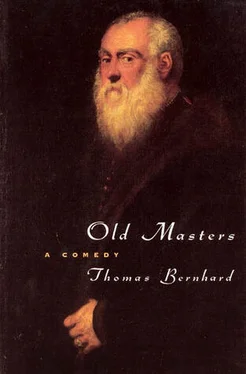shows up these mistakes. In this sense, moreover, Reger said, the always unthinkingly uttered dictum of
Seek and you shall find is found to be true. Anyone searching in this museum for mistakes in these hundreds of so-called masterpieces will also find them, Reger said. No work in this museum is free from mistakes, I say. You may smile at this, he said, it may alarm you, and it makes me happy. And there is of course a reason why I have, for over thirty years, been going
to the Kunsthistorisches Museum and not
to the Science Museum across the road. He was still sitting on the settee, with his black hat on his head, quite motionless, and it was obvious that for a long time now he had been contemplating not the
White-Bearded Man but something entirely different
behind the
White-Bearded Man, not Tintoretto but something far outside the museum, while I myself was admittedly regarding Reger and the
White-Bearded Man and yet was seeing behind it the Reger who had explained the fugues to me the day before. I had heard him explain the fugues so often before that I did not feel like listening to him attentively yesterday, and although I followed what he was saying, and it was most interesting, for instance what he had to say about Schumann's attempts at the fugue, I had been quite elsewhere with my thoughts. I saw Reger sitting on the settee and beyond it the
White-Bearded Man, and I saw Reger once again, with even greater affection than before, trying to elucidate to me the art of the fugue, and I heard what Reger was saying and yet I was gazing into my childhood and heard the voices of my childhood, the voices of my brothers and sisters, the voice of my mother, the voices of my grandparents in the country. As a child I used to be quite happy in the country, but I was always happy back in town again, just as later and to this day I am far happier in the city than in the country. Just as I have always been far happier in art than in nature, nature has, all my life, been
uncanny to me, while in art I have always felt
secure. Even in my childhood, which I predominantly spent in the care of my maternal grandparents, and when, taken all in all, I was really happy, I have always felt secure and at home in the so-called world of the arts, not in nature, which I have always admired but always just as much feared, and this has not changed to this day, I do not feel at home for a moment in nature, but always so in the world of the arts, and the most secure of all in the world of music. As far as I can think back, I have loved nothing more in the world than music, I reflected, looking right through Reger, out of the museum and into my childhood. I always love these perspectives into my long-past childhood and I surrender to them totally and I exploit them in whatever way I can, may this perspective of my childhood never end, I always reflect. What kind of childhood did Reger have? I reflected, I do not know much about it, Reger is not communicative about his childhood. And Irrsigler? He does not like talking about it, nor does he like looking back to it. Towards noon more and more people come to the museum in groups, lately an extraordinary number from the East European countries, for several days running I saw groups from Soviet Georgia, driven through the gallery by Russian-speaking guides,
driven is the right word, because these groups do not walk through the museum, they rush through it, hustled, and basically totally uninterested, totally exhausted by all the impressions which bombarded them on their journey to Vienna. Last week I observed a man from Tbilisi who had detached himself from one of the Caucasian groups and had tried to make his way through the museum on his own, a painter as it turned out, who asked me about Gainsborough; I was able to oblige him and tell him where to find Gainsborough. In the end his group had already left the museum when he approached me and asked me about the
Hotel Wandl, where his group was accommodated. He had spent half an hour in front of the
Landscape in Suffolk without giving his group a moment's thought, this was the first time he had been in central Europe and the first time he had seen an original Gainsborough. That Gainsborough was the high spot of his trip, he said, in surprisingly good German, before turning and leaving the museum. I had offered to help him find the
Hotel Wandl but he had declined. A young painter, of about thirty, travels with a group to Vienna and looks at the
Landscape in Suffolk and says that seeing the
Landscape in Suffolk has been the high spot of his trip. This fact made me reflective the whole ensuing afternoon and well into the evening. How does that man paint in Tbilisi? I had asked myself all that time before eventually dismissing the thought as nonsensical. Lately there have been more Italians than Frenchmen, more Englishmen than Americans visiting the Kunsthistorisches Museum. The Italians with their innate understanding of art always act as if they were initiated from birth. The French tend to walk through the museum rather bored, the English act as if they knew and had seen everything. The Russians are full of admiration. The Poles regard everything with arrogance. The Germans at the Kunsthistorisches Museum look at their catalogue all the time while they go through the rooms, and scarcely at the originals hanging on the walls, they follow the catalogue and, as they walk through the museum, crawl deeper and deeper into the catalogue until, having reached the last page of the catalogue, they have therefore reached the exit from the museum. Austrians, especially Viennese, rarely go to the Kunsthistorisches Museum if one disregards the thousands of school classes which pay their duty visit to the Kunsthistorisches Museum every year. The school classes are guided through the museum by their teachers, men or women, which has a devastating effect on the pupils because, during these visits to the Kunsthistorisches Museum, the teachers by their schoolmasterly narrow-mindedness stifle any perceptivity which these pupils may have for paintings and the men who created them. Dull-witted as they generally are, they very quickly kill in the pupils in their charge any feeling not only for painting, and the visit to the museum through which they lead their, so to speak, innocent victims as a rule, by their dull-wittedness and consequential dull-witted garrulousness, thus becomes the last visit to a museum by any of these individual pupils. Having once visited the Kunsthistorisches Museum with their teachers, these pupils never enter it again as long as they live. The first visit of all these young people is simultaneously their last. On these visits the teachers destroy for good the interest in art of the pupils in their charge, that is a fact. The teachers ruin the pupils, that is the truth, that is a century-old fact, and Austrian teachers in particular ruin in their pupils any taste for art from the start; at first all young people are receptive to everything, hence also to art, but the teachers thoroughly drive the art out of them; the predominantly dull-witted heads of Austrian teachers to this day proceed ruthlessly against their pupils' longing for art and generally for anything artistic by which all young people are initially fascinated and delighted in the most natural way. The teachers, however, are through and through
petit-bourgeois and instinctively act against their pupils' fascination by art and enthusiasm for art by reducing art and generally anything artistic to their own depressing stupid dilettantism and by turning art and generally anything artistic at school into their repulsive recorder playing and an equally repulsive and incompetent choral singing, which is bound to repel the pupils. Thus the teachers from the very outset block their pupils from access to art. The teachers do not know what art is, and therefore cannot explain to their pupils or teach them what art is, and they lead them not
Читать дальше












